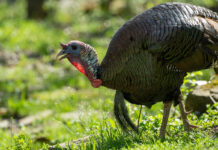As my wife and I emerged from the woods a few evenings ago, I noticed a patch of blue on the trail ahead. In fact, I almost stepped on it.
It was a pure blue robin’s egg in seemingly pristine condition. We immediately scanned the branches over ahead, but could not find a nest. So we searched the ground. I thought perhaps wind from a recent storm had blown down a nest from an overhead crotch. Nothing.
Then I picked up the egg and examined it more closely. It was perfect, except for a small puncture on the side. It was as if someone had plunged an ice pick through the shell.
Aggressive creatures
This was the work of a house wren. House wrens are extremely territorial and aggressive. While most birds limit their aggression to members of their own species, house wrens are interspecifically antisocial. Within their small territory of an acre or so, they don’t like any other birds nesting nearby.
When house wrens find a nest in another cavity near their own, they often enter the cavity while it’s unoccupied and puncture the eggs. This kills the developing embryos and forces the “intruders” to nest again elsewhere.
Sometimes they then remove the egg from of the nest and drop it some distance away. House wrens usually confine this nasty behavior to other cavity nesters. It’s a way to “own” all the cavities within their territory. But sometimes they even puncture eggs in nests of open, cup nesting species. In addition to the robin egg I described earlier, I’ve seen eggs of phoebes, towhees, cardinals and song sparrows similarly destroyed.
I don’t know that other species avoid building nests near active house wren cavities, but they should. I suspect many people would agree with my wife’s opinion of house wren’s aggressive territorial behavior. She finds it “despicable.”
What house wrens do
But it is neither good nor bad. It’s just what house wrens do. It is just one of many tactics they use to gain an advantage in the intense competition for the relatively few nesting cavities available.
From a biological standpoint, I admire their ability to confront and frustrate larger competitors. House wrens are the most widespread of the nine species of wrens that inhabit the United States. They live in brushy old fields, shrubby backyards, and forest edges. Often they are the first occupants of a backyard bird house.
(If house wrens occupy nest boxes intended for bluebirds, the boxes are probably too close to dense vegetation. Remember, bluebirds prefer more open habitat.)
Drab and brown, house wrens are nondescript, but their explosive, bubbly song is distinctive, especially when sung at 5:30 a.m. outside the bedroom window.
House wrens usually attempt their first nest in early May, shortly after arriving in the spring. And nesting continues well into August. I’ve found active nests as late as Aug. 26.
Finding nests
House wren nests are easy to recognize in a nest box. At first it seems the nest is simply a jumble of small twigs. But deep in a back corner rests a tiny cup lined with rootlets, grass, leaves, animal fur, and a feather or two.
Here the female lays five to eight eggs and incubates them for 13 days. After the eggs hatch, both parents feed the nestlings for about 17 days until they are ready to fledge.
Two broods per season are typical, and some females raise three. Though house wrens are common and widespread, they are sometimes confused with Carolina wrens. House wrens are small, drab, explosive singers, and they arrive in early May. Carolina wrens are bigger, light below, chestnut brown above, have a prominent white eyeline, sing “Tea-kettle, tea-kettle, tea-kettle!” and do not migrate.
And speaking of Carolina wrens, mine have disappeared. After about 10 years of increasing numbers, my Carolina wrens vanished in April.
In early April, I had three singing males around the yard. By the end of the month, they were all gone, and I haven’t found a single Carolina wren nest this year. Perhaps predators have had a good year and taken them all, but I wonder if any readers have observed a similar disappearance of Carolina wrens this year.
If you have, please let me know.
Send questions and comments to Dr. Scott Shalaway, RD 5, Cameron, WV, 26033 or by email via his website at http://scottshalaway.googlepages.com













Dear Scott, We recently noticed this last week we have house wrens dive bombing us. We go in or out our front door and they are chirping and attacking us. It’s even hard to take the dog outside to do her business. My daughter has been pecked . We are constantly ducking from them making contact with us. Is there anything we can do so the wrens don’t attack us? Thank You, Sincerely, Robin Albright
For the first years of moving into my extremely rural property, I also experienced a very aggressive male house wren who also dive-bombed me and I swear parted my hair on more than one occasion. He used to screech and swear at me and my dogs whenever we sat on our deck (which is usually all day every day in the summer, as I live in Canada and after a very long cold winter, we make the most of it) He was also a noisy little demon and would sing all day every day until he found a gal of his choice. I find their birdsong delightful, but this guy was after the prize! I’m guessing he either passed away of old age or met a fate of some sort, as less aggressive couples now occupy my nesting boxes. I find them the sweetest little creatures, and are definitely my favorite breed of bird. I can offer no advice I’m afraid for the aggressiveness you are experiencing – other than wear a hat!! Good luck! They are still so worth having around! ;)
I would try leaving food out for them somewhere; Google “what do house wrens eat”
I have a pair of House Wrens nesting and feeding their brood right in a old plantholder located in my covered doorway. I sit on my bench which is located no more than 15ft away. Both Wren’s go about their business clearly knowing I’m there. Both bring insects regularly and have absolutely no issue with my presence. Perhaps they perceive no threat from me.
I am experiencing my first aggressive wrens this season. They take turns guarding the house. Today I saw them attack a hummingbird at its feeder. I was highly annoyed! About ready to move the wren house as I enjoy the hummers much more. I am waiting for one to attack me or my dog….then I go out with a broom in the air and war has begun.
Two years ago I found the sparrow’s three babies on the floor in my carport and wondered how the parents could be so careless that their babies fell out of the nest.
Last year a Wren moved into one of our birdhouses. Now it makes more sense.
I also noticed at the end of the season he went from singing to hissing. He hasn’t come back so far this year. That is okay with me.
I have a pair of Carolina wrens that come to my porch during the day and eat all the bugs around the eyes of the porch and out of the plants. Every night at 7:45 he flies up to the corner eve and sleeps until dawn with his face in the porch corner like he’s in time out. It’s the cutest thing and the first season this has happened to me in 6 years of living in this house. The last two nights he hasn’t come in for bed time so I’m wondering if he was just waiting on babies to hatch somewhere to begin his father duties. I miss him! I hope he’s ok. I’d love to know if others have experienced this.
We have had them for several years. They do miss a lot of nights but usually show back up within a few days. I’ve noticed them sleeping in the overhang of my shed, also, so they will sleep in different spots. And, they can sleep on the TINIEST LEDGE! Time out. That’s a really good description!
My mother has a bird who comes every evening just to sleep inside her porch. It’s the same exact spot – located up inside the ceiling on a ledge. This cutie also faces the corner as if he’s in time out. It’s funny because he’s gone the whole day and only comes to her porch to sleep. He’s always on time too. Leaves at the exact same time in the mornings and returns the exact same time at night.
I had a bluebird house set apart. From the wren house . the wren pecked the eyes out of the baby bluebirds . I was sick. what am I too do?
we have a bird that does this,,,leaves at light and and 7:30 darkness comes and sleeps in the umbrella cloth pouch ,,,,, with it’s head down , like it is in time out …
I have a wren in my porch in UK too, clicks at 5am, sings loudly intermittently for a few seconds in the middle of the night. Last night the light was out and i came in with a torch, this scared him into flying out into the dark, but sure enough after the light went on he or his mate was clicking at 5:30am in the porch again. I even held him or his pal in my hand when they got trapped once, they are incredible close-up.
I have quite a few boxes on my 11 acres and the only birds that cause complete havoc are the house wrens so bad that I don’t allow them to nest in my boxes Any more because they killed chickadee babies in all of my boxes.I felt so bad so I am using a wren guard when the chickadees start the nest building and I place the dee’s box close to my house and away from the brush and it has helped.
We had eastern bluebirds in our nest boxes for about five years, until the house wrens showed up.
They killed the bluebird babies, and dragged them out of the nests. They did the same with the tree swallows; killed the babies, and one of the adults. Now the bluebirds and swallows no longer come here. We kept putting the nest boxes out, but got nothing but wrens, so, no more boxes. We refuse to help the wrens breed. I know they’re just doing their thing, but I don’t have to like it…or them!
wrens are taking over and ! help ! I lost my phoebes; the mother actually raised the babies as her own but was confused I must say – we all were until I delved deeper into the wrens behavior
I just this past year got bluebirds and I think they were interfering with the amount of phoebes around but not aggressively like the wrens. They need to go, how do I do that humanly? We need answers. I can’t stand their loud voices. I want my phoebes back. I don’t even hear many thing year. And the phoebe that was here is just hanging around like what gives. She lost her first nest to wrens; I don’t want to lose another one.
I have the same exact problem as Vicki, PLEASE we need answers! These wrens have got to go. I wonder if the plastic owls would help. I miss seeing and hearing all of my other bird friends that use to hang around and eat and sing and use my bird bath. This is just terrible. Thanks for understanding and helping with this matter.
I just “looked up” wrens on the internet and found your comments. I thought I’d add my recent wren story. We live in the west section of Tennessee (Memphis suburbs) and have lots of trees and shrubs in our neighborhood. In the last week or so when we open our front door and went outside at night, on two occasions we left the door open, for a few minutes. When we came back in, low and behold, a wren was flying around in our living room. We couldn’t catch him, so we got a large towel each and began “herding” him toward the front door. Suddenly one of his companions decided to join him inside our house. The 12 foot ceilings, numerous chandeliers, lamps and artificial plants made excellent rest areas for the interlopers – each of whom rendered a loud tune or two for us. Finally we waved our hand towels side by side which frightened the “little darts,” ushering them back towards the front door. Twenty or so minutes, and several bird droppings later, they each flew out, undaunted, undamaged, and we were “free at last” of these frisky creatures! No harm done-beautiful little birds!
Near Dodgeville Wisconsin we are restoring a Norwegian immigrant log home. Last summer two wrens decided to make a nest in a mortice hole in the timber framing. We cleaned out their nest material several times, but they succeeded in finding a hole that we missed. They tolerated us working close by. I had found other nesting places with just sticks—-I thought they were mouse nests. A friend told me that the male wren makes multiple rudimentary nests and then lets the female choose which one she likes. She then adds soft material to complete the job. We decided to let them stay and complete their project. We worked at the other end of the building. They persisted over several months in spite of our interference and raised their family! My hat is off to them. Excuse me now—I have to get to work. – Nels
I simply adore this little creatures, they make my day!!! I have not had any problems with them, this is the second year they nest outside my porch,
Last year they lost their eggs to squirrels
Hopefully this time they are successful.
I’m a little worried tho, I haven’t seen neither the male nor the female in the past three days.
I hope they are ok, they need to come back and finish their job,
I’m really looking forward to seeing their babies flying out their nest .
Greetings from Texas
My cousin in Leonia, New Jersey had sparrows nesting outside, under her window air conditioner. A few weeks ago she came home and saw two sparrow babies laying on her driveway. She thought, oh, the mother sparrow was out finding food for them, and they tried to fly and fell out of the nest. Now after reading all of your posts here, I am thinking, it could have been house wrens……
I’ve got a little train bird box on my back porch and the friendliest little house Wren built a nest inside and from what I can tell there are 3 babies. Less than 6 feet away is a nest that’s been used for years alternating robins and sparrows. Currently with it’s second batch of 3 robin babies for the years. The wren and robins don’t see to bother each other and none of them mind me sitting on the porch within a few feet watching them and taking photos and videos of them. After reading this article, it seems unusual that they don’t seem to mind each other.
I have had a wren couple in one of three bird houses for the last several summers. I love hearing the male singing as he protects the nest. This morning I found the bird house lying on my patio. I had witnessed the two hatchling fly off several days ago and I think momma was reclining the nest for another brood. I hope she comes back, but I think a squirrel must have knocked the nest off the fence top. She was upset that the nest had been violated and was in and out several times with a bill
full of feathers since I replaced the bird house. I’m sure the nest was damaged when it fell (a 5’ drop) Maybe they will move over to the next house. Rent free, lots of entertainment.
Alice/ Ohio
I feel so bad – I’ve had a wren family preparing their next brood – 4 chicks I think, or 5. In the past I’ve seen them prepare to fly, and safely fly off, but last year, we had an intense heat wave in late April, and they must have died. This year another momma and poppa watched the young ones grow, and we had a heat wave, a bit later so they’d have a chance. But I just saw a dead wren chick lying on my porch. I think one is left in the nest but not very strong and momma does not come so often. It feels so sad to make friends with the mother and cheer on the family only to see them attacked by something and die!!
Good morning!
Last year we had a very aggressive house wren tormenting the Bluebirds. His wren house was about 20 yards away but this guy would not give up on the Bluebirds. Utilizing my infinite wisdom and profound logic, I moved the wren house to the post between the two Bluebird boxes (they are about 30’ apart). Figured he wanted to be there anyway. He immediately stopped harassing the Bluebirds, he and a mate moved in, raised and fledged a brood without further incident.
NOW I know it was probably not the best idea that I’ve ever had. BUT we had never had a problem with the wrens and Bluebird’s for many years prior.
I removed the wren house in the fall. During this past winter we final saw the male Carolina Wren we had been hearing.
I moved the wren house about 300’ away into the front yard, in a Magnolia tree, in early March this year.
Low and behold, the Carolina wren had found a mate and raised a brood of four. They fledged successfully a week ago.
Our Bluebirds have recently fledged the first brood without interference and are now setting up in the adjacent nest box.
The local house wren has taken exception and is now harassing them. He is apparently nesting in a tree cavity nearby (we have many in our woods).
Not sure a nest guard will help at this point.
And no I am not going to put a wren house up for him.
I have done my research and realize I was just lucky last year. Just keep chasing him away? Bluebird’s don’t mind when I go over there. They just sit and watch. Maybe they like the mealworm’s I put out!
I am glad I read these posts, have been flummoxed why a wren in my small Denver backyard keeps attacking me when I’m gardening. He gets real close and then touches the top of my head. He is protecting a nearby nest which I understand, but I’ve had wrens nesting most years and never experienced this aggression. Now that I know this is common wren behavior I’m ok with it. I love wrens, they are adorable and have a sweet song. Thank you for educating.me.
I would like to kill all the wrens on my property. All day beginners at daylight they start talking back and forth loud piercing sounds not singing,into my ears. Over and.over again Very annoying I waiting for them to stop but they don’t. I’m a nice man, love birds but despise this type.
It is interesting that a “hunt the wren” song and tradition in Europe has been around for centuries.Your comments reminded me of the song “The wren, the wren” and I googled it, twas very entertaining.
We’ve had wrens the past several years. None so far this year in our NW Ohio yard. We cleaned out the old wren house last fall so don’t know if the cleaning affected their coming back to the wren house this year.
Well, this explains a lot. We have a couple of bird houses in our small suburban backyard. Year after year we’d have a pair of Oak Titmice return to one of our bird houses and raise a brood. (One year it was TEN eggs that all successfully fledged!) Then one year they abandoned their clutch of eggs and never returned.
About 25′ away we have another bird house that House Wrens had moved into. They return every year and now they’re the only birds that occupy any of our bird houses. I’m starting to wonder whether they’ve chased all the other bird species away? I do enjoy the show the House Wrens put on, but I much prefer other species’ nesting habits.
Wrens have nested on my porch and are presently feeding a brood.
Personally have removed several dozen house wrens from our property in the last several years, they kill anything they get a chance at, even tried getting into an occupied purple martin house. I do not approve of any measures to accommodate them or even to relocate them if you did want to try it
Had a house wren building a nest under our birdhouse feeder. Could not believe he could fit in that crack. So I looked up House Wrens and learned that they are aggressive.
Maybe that is why one of our hummingbirds looked so beat up and finally disappeared. We have an occasional hummer now and then,.but the when’s nest was about 8′ from the feeder. No way. I went out and brought the feeder in. The wren returned and was totally confused……….could.not believe that it was gone. I hope it does not return. We have titmouse, phoebe’s, robins, cardinals, chickadee and we don’t need trouble with the wrens.
So sad that even birds can be troublesome.
A pair of wrens for the last two weeks have been complaining when I go out with my schnauzer. Today was the first day that one of the wrens dive bombed my schnauzer and pecked him on his back. This evening we went out and one of the wrens flew down and pecked the back of my Charlie’s head. He had no idea what was going on! I suppose they are protecting their nest but we weren’t bothering them.
I, too, love my Carolina Wrens! The nest was originally built by a robin, and we hung a Nest camera (how appropriately named) overhead. The robin sat on her eggs with occasional breaks — till a wren came and destroyed all her eggs. She came back to witness the assault and never returned. The wrens took over.
We definitely have 1 couple plus a smaller wren who arrive every night at sunset and leave at dawn, like clockwork. But lately, we have had up to 6 wrens in the nest at once! They cuddle all together, sometimes squeezing underneath another – I supposed due to the cold here in the northeast. Twice, recently, I have witnessed fights between 2 birds — perhaps we are close to breeding season?